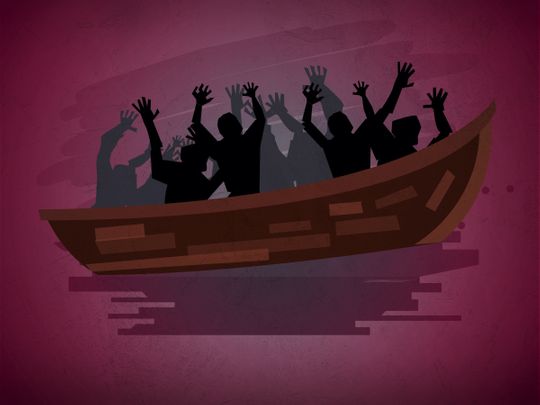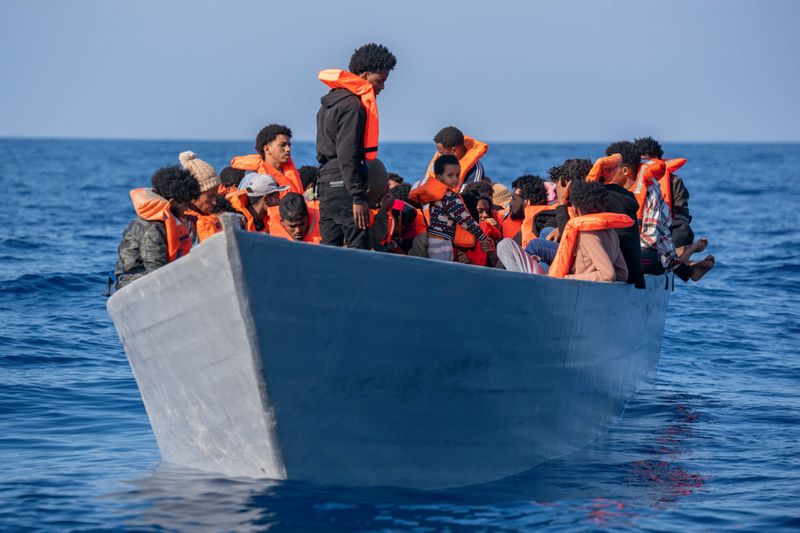
As the world comes to grips with the horrific effects of global warming this July, said to be the hottest month on record with searing temperatures hitting southern Europe, North America and most of China, another global challenge is emerging which is closely related and requires international cooperation: illegal, or irregular, immigration.
On Sunday, Italian Prime Minister Giorgia Meloni hosted the leaders of more than 20 countries from the Mediterranean, the Middle East and North Africa in Rome for a one-day summit to tackle the growing and multifaceted challenge of illegal immigration.
Titled “The International Conference on Development and Migration”, the leaders launched the “Rome Process” to prevent and tackle irregular migration and human trafficking.
Strategic partnership
Meloni welcomed a pledge by the UAE to provide $100 million and said the next step would be to organise a donors’ conference. The announcement was made by UAE President His Highness Sheikh Mohamed bin Zayed Al Nahyan who attended the Rome conference. The money will go to support development projects in countries affected by irregular immigration.
The link between development and stemming the flow of illegal migration is key here, since among the top factors that force people to risk their lives — at least 400 drowned while crossing the Mediterranean between January and March this year alone — are economic deprivation, poverty and political instability in home countries.
Tunisia, which is a major country of departure for African immigrants, especially to Italy, has been embroiled in economic and political turmoil for over a decade.
Earlier this month the EU and Tunisia signed a “strategic partnership” that includes combating human traffickers and tightening borders, but it also includes a European pledge of 1 billion euros in aid to help Tunisia’s battered economy, tied to carrying out key economic reforms. Meloni has been instrumental in negotiating such a deal.

Transitional Organised Crimes
The Tunisia-EU model could pave the way for other deals to be worked out with African countries whose political, economic and environmental challenges are forcing thousands to seek refuge in Europe. “We want our agreement with Tunisia to be a template; a blueprint for the future, for partnerships with other countries in the region,” European Commission head Ursula von der Leyen told the conference.
Meloni is a controversial character because before she was elected she promised to close Italy’s maritime borders to illegal immigrants. But since she took over in October 2022, the 46-year-old head of the most right-wing government since the Second World War has toned down her positions. Last week in Rome she said that her government was open to taking in more people through legal routes as “Europe and Italy needed immigration.”
The Italian government has pledged to issue 452,000 new work visas for non-EU nationals from 2023 to 2025, even as illegal immigrants landing this year on Italian shores reached over 80,000 compared with around 34,000 in the same period in 2022.
While the task of stemming the tide of illegal immigrants will be huge — the war in Sudan, turmoil in Central Africa and the Horn of Africa, not to mention the instability in Syria and natural disasters in Pakistan and Afghanistan all of which will drive people from their countries — the challenge can still be met.
One of the biggest challenges is human trafficking, or what the UN calls Transitional Organised Crimes. Migrants more often than not fall easy prey to smuggling rings that take advantage of their suffering and need. The UN estimates that two of the principal smuggling routes — leading from East, North and West Africa to Europe and from South America to North America — generate about $6.75 billion a year for criminals.
Migrants are vulnerable
Migrants are vulnerable to abuse and exploitation and an unknown number perish even before reaching the shores of the Mediterranean — in the deserts and jungles or simply suffocate in containers. It is imperative that this trade in humans be contained. And for this to take place, the solution lies in countries of origin.
This is why an international alliance like the one born in Rome should examine the illegal migrants issue from all its angles. The problem does not begin as the boats laden with exhausted migrants reach the European shores, but at home.
While walls alone will not prevent illegal migration, what is really needed is a bold and sustainable initiative to help poor and underdeveloped countries rebuild their economies and that includes debt relief, which has become the elephant in the room.
There is a need for a new economic order that takes the welfare of the least fortunate into account. The developed world must invest in the dilapidated infrastructure of the poorest and most populous countries in order to stop the trend of immigration in its tracks.
Meanwhile, and as the UAE prepares to host COP28 in November on climate change, the link between illegal immigration and global warming must take precedence following the Rome meeting.
Environmental displacement is a reality and as the world as a whole suffers from extreme weather phenomenon, sea-level rise, droughts, and loss of agricultural productivity, experts must address how such factors can also impact livelihoods and economic opportunities, particularly in vulnerable regions.
This can lead to economic hardships, poverty, and insecurity, which may prompt individuals to seek better prospects elsewhere, including through irregular migration.
Osama Al Sharif is a journalist and political commentator based in Amman.










